Academic Skills Project: Analyzing Teamwork, Motivation, and Time
VerifiedAdded on 2023/06/10
|10
|3346
|211
Report
AI Summary
This report explores the importance of academic skills, specifically teamwork, motivation, and time management, for effective work management in various settings. It explains each skill, elaborates on their significance for students' academic and professional futures, and analyzes their personal impact. The report details the stages of teamwork, highlighting its benefits such as diverse perspectives, improved efficiency, and enhanced learning opportunities. It discusses how teamwork has personally improved the author's skills through feedback, personal development, analytical thinking, and resource management. The report also emphasizes the role of motivation in achieving success and satisfying individual needs, discussing its impact on achievements, friendly environments, efficiency, and stability. Furthermore, it touches upon Maslow's hierarchy of needs theory as a motivational framework. Lastly, the report examines time management, outlining its principles and the Stephen Covey Time Management Matrix, concluding that mastering these skills is crucial for academic and professional success. Desklib provides students with access to similar solved assignments and study resources.
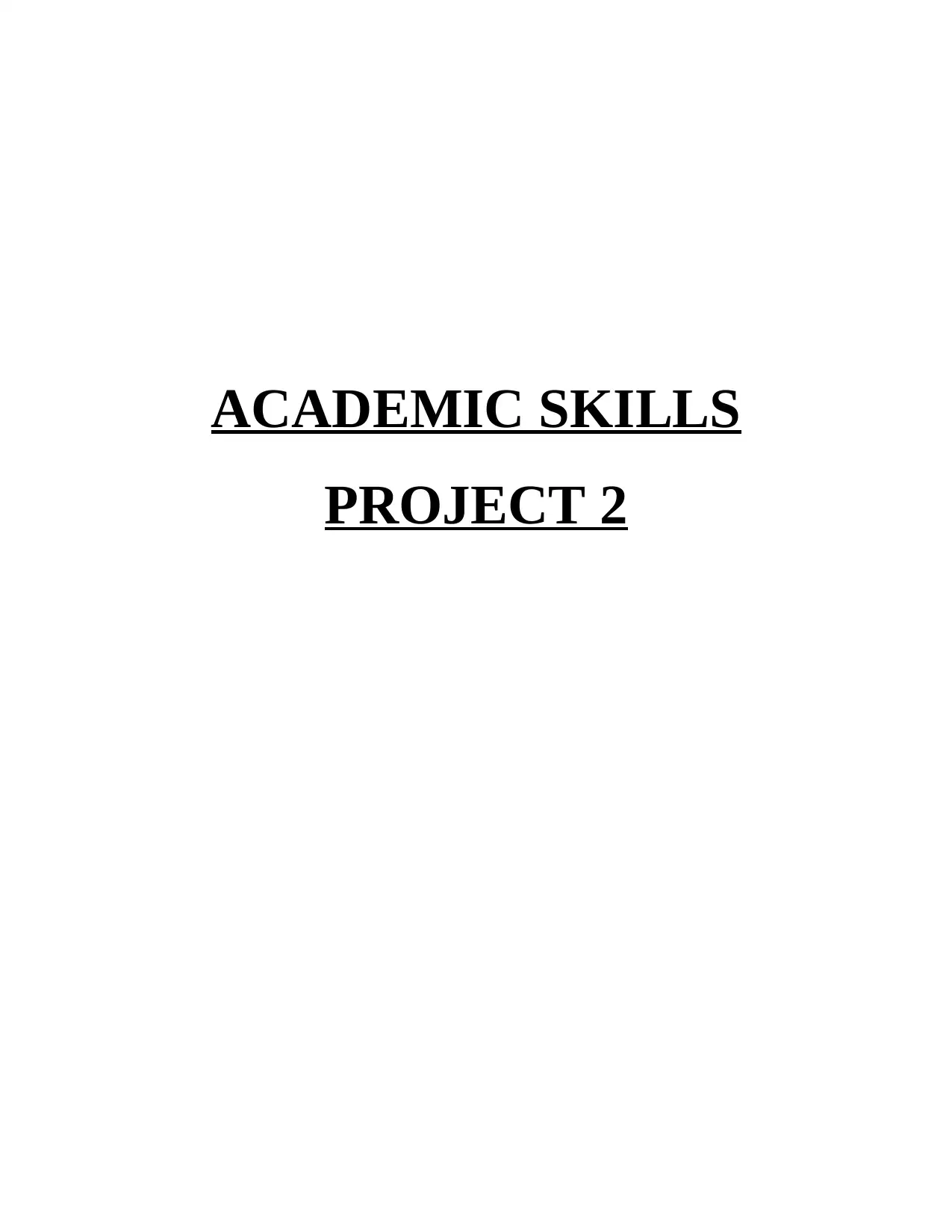
ACADEMIC SKILLS
PROJECT 2
PROJECT 2
Paraphrase This Document
Need a fresh take? Get an instant paraphrase of this document with our AI Paraphraser
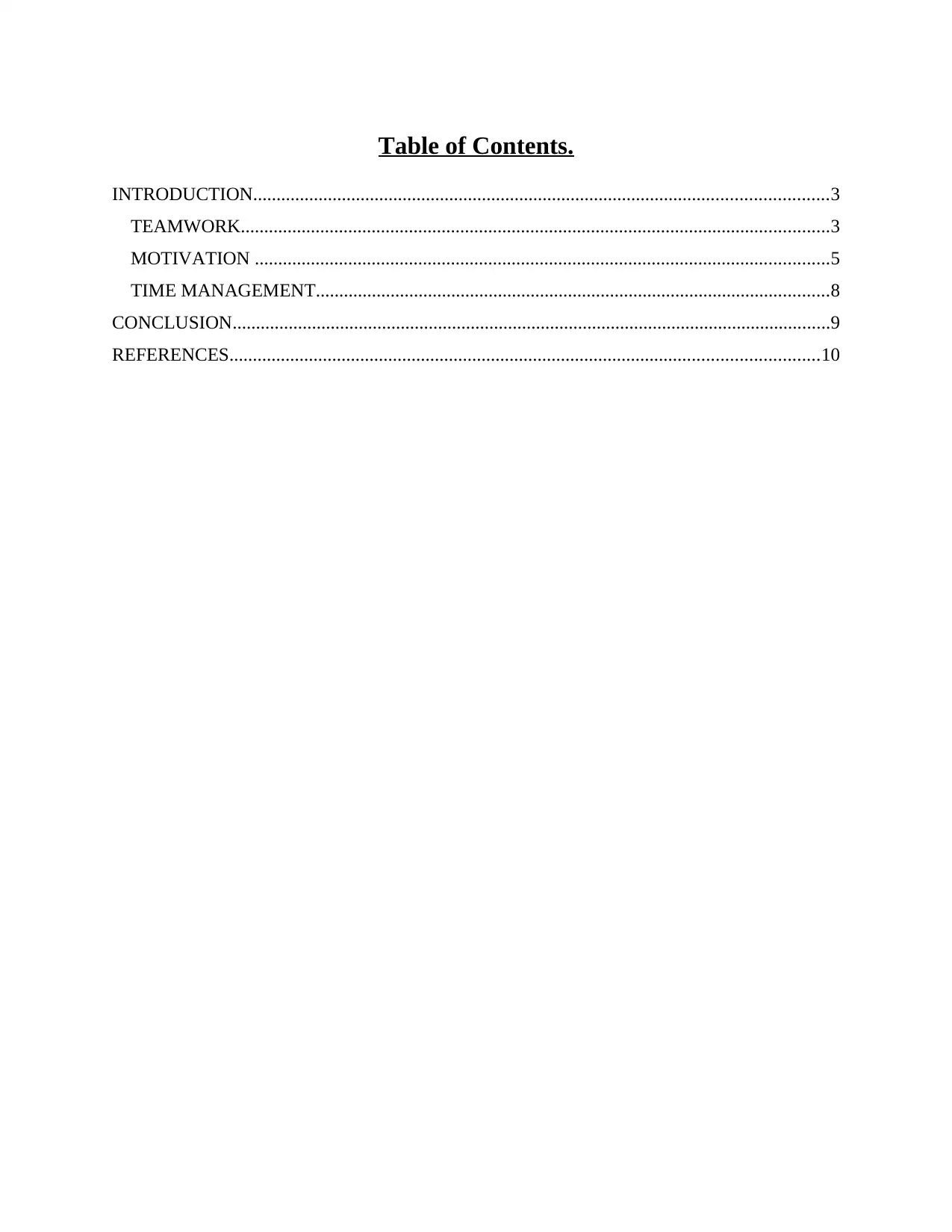
Table of Contents.
INTRODUCTION...........................................................................................................................3
TEAMWORK..............................................................................................................................3
MOTIVATION ...........................................................................................................................5
TIME MANAGEMENT..............................................................................................................8
CONCLUSION................................................................................................................................9
REFERENCES..............................................................................................................................10
INTRODUCTION...........................................................................................................................3
TEAMWORK..............................................................................................................................3
MOTIVATION ...........................................................................................................................5
TIME MANAGEMENT..............................................................................................................8
CONCLUSION................................................................................................................................9
REFERENCES..............................................................................................................................10
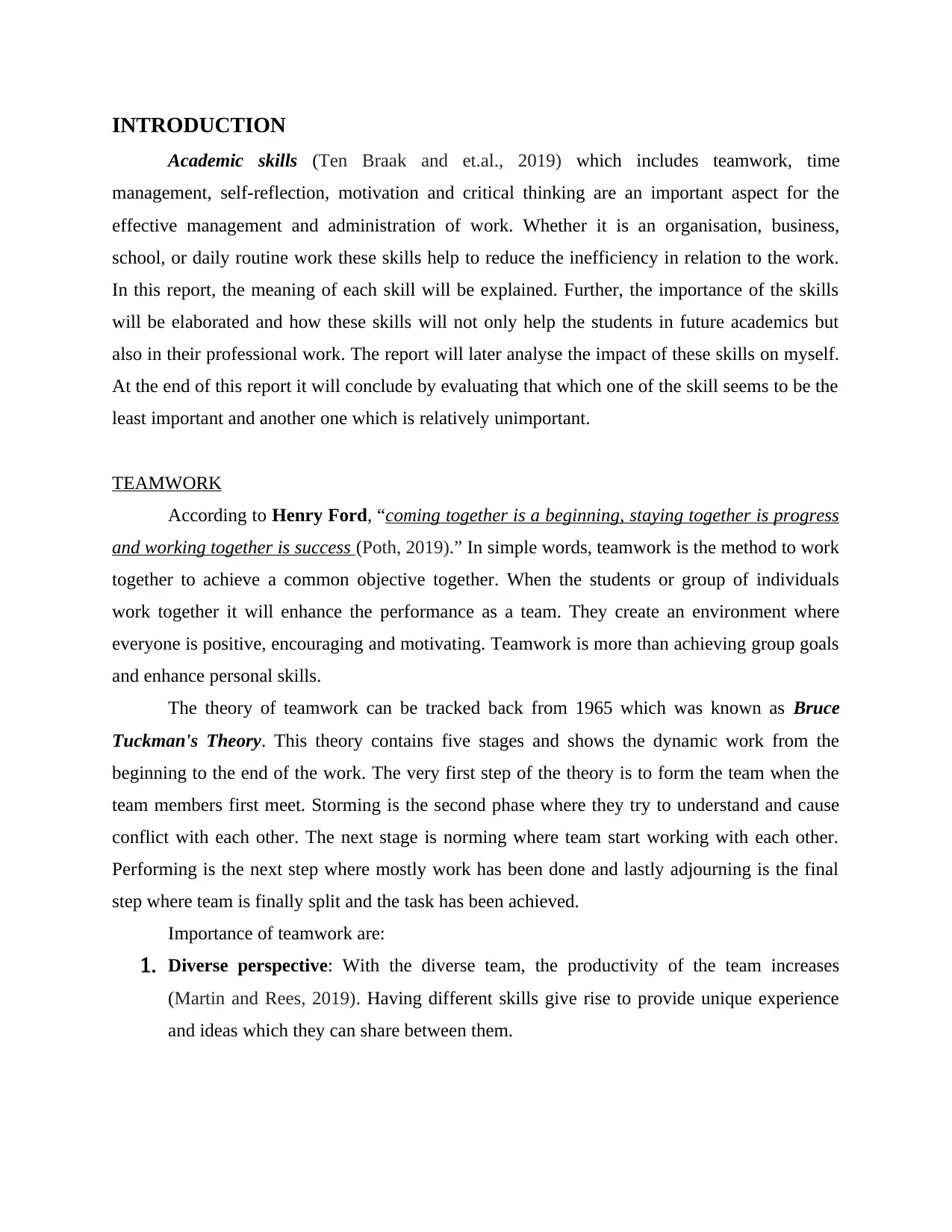
INTRODUCTION
Academic skills (Ten Braak and et.al., 2019) which includes teamwork, time
management, self-reflection, motivation and critical thinking are an important aspect for the
effective management and administration of work. Whether it is an organisation, business,
school, or daily routine work these skills help to reduce the inefficiency in relation to the work.
In this report, the meaning of each skill will be explained. Further, the importance of the skills
will be elaborated and how these skills will not only help the students in future academics but
also in their professional work. The report will later analyse the impact of these skills on myself.
At the end of this report it will conclude by evaluating that which one of the skill seems to be the
least important and another one which is relatively unimportant.
TEAMWORK
According to Henry Ford, “coming together is a beginning, staying together is progress
and working together is success (Poth, 2019).” In simple words, teamwork is the method to work
together to achieve a common objective together. When the students or group of individuals
work together it will enhance the performance as a team. They create an environment where
everyone is positive, encouraging and motivating. Teamwork is more than achieving group goals
and enhance personal skills.
The theory of teamwork can be tracked back from 1965 which was known as Bruce
Tuckman's Theory. This theory contains five stages and shows the dynamic work from the
beginning to the end of the work. The very first step of the theory is to form the team when the
team members first meet. Storming is the second phase where they try to understand and cause
conflict with each other. The next stage is norming where team start working with each other.
Performing is the next step where mostly work has been done and lastly adjourning is the final
step where team is finally split and the task has been achieved.
Importance of teamwork are:
1. Diverse perspective: With the diverse team, the productivity of the team increases
(Martin and Rees, 2019). Having different skills give rise to provide unique experience
and ideas which they can share between them.
Academic skills (Ten Braak and et.al., 2019) which includes teamwork, time
management, self-reflection, motivation and critical thinking are an important aspect for the
effective management and administration of work. Whether it is an organisation, business,
school, or daily routine work these skills help to reduce the inefficiency in relation to the work.
In this report, the meaning of each skill will be explained. Further, the importance of the skills
will be elaborated and how these skills will not only help the students in future academics but
also in their professional work. The report will later analyse the impact of these skills on myself.
At the end of this report it will conclude by evaluating that which one of the skill seems to be the
least important and another one which is relatively unimportant.
TEAMWORK
According to Henry Ford, “coming together is a beginning, staying together is progress
and working together is success (Poth, 2019).” In simple words, teamwork is the method to work
together to achieve a common objective together. When the students or group of individuals
work together it will enhance the performance as a team. They create an environment where
everyone is positive, encouraging and motivating. Teamwork is more than achieving group goals
and enhance personal skills.
The theory of teamwork can be tracked back from 1965 which was known as Bruce
Tuckman's Theory. This theory contains five stages and shows the dynamic work from the
beginning to the end of the work. The very first step of the theory is to form the team when the
team members first meet. Storming is the second phase where they try to understand and cause
conflict with each other. The next stage is norming where team start working with each other.
Performing is the next step where mostly work has been done and lastly adjourning is the final
step where team is finally split and the task has been achieved.
Importance of teamwork are:
1. Diverse perspective: With the diverse team, the productivity of the team increases
(Martin and Rees, 2019). Having different skills give rise to provide unique experience
and ideas which they can share between them.
⊘ This is a preview!⊘
Do you want full access?
Subscribe today to unlock all pages.

Trusted by 1+ million students worldwide
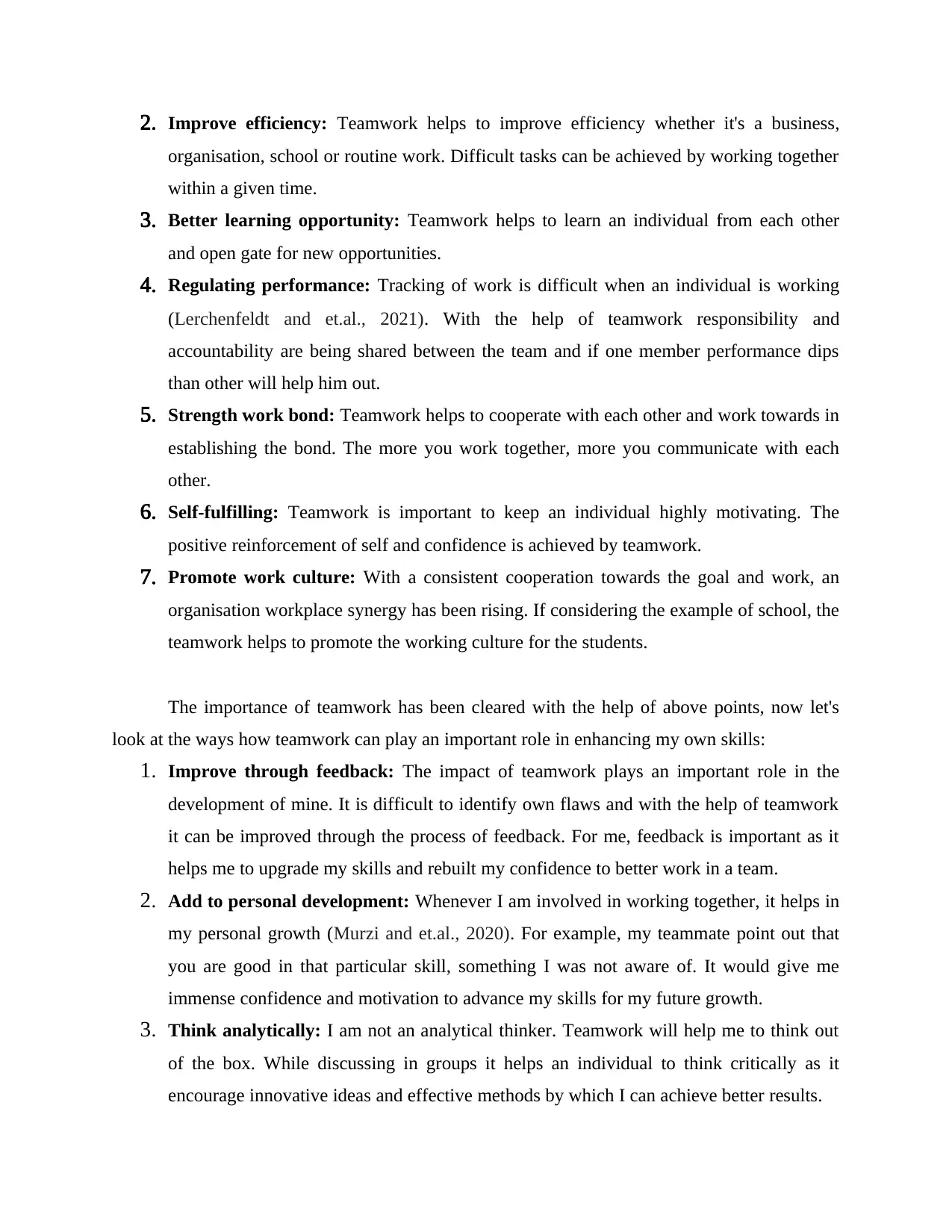
2. Improve efficiency: Teamwork helps to improve efficiency whether it's a business,
organisation, school or routine work. Difficult tasks can be achieved by working together
within a given time.
3. Better learning opportunity: Teamwork helps to learn an individual from each other
and open gate for new opportunities.
4. Regulating performance: Tracking of work is difficult when an individual is working
(Lerchenfeldt and et.al., 2021). With the help of teamwork responsibility and
accountability are being shared between the team and if one member performance dips
than other will help him out.
5. Strength work bond: Teamwork helps to cooperate with each other and work towards in
establishing the bond. The more you work together, more you communicate with each
other.
6. Self-fulfilling: Teamwork is important to keep an individual highly motivating. The
positive reinforcement of self and confidence is achieved by teamwork.
7. Promote work culture: With a consistent cooperation towards the goal and work, an
organisation workplace synergy has been rising. If considering the example of school, the
teamwork helps to promote the working culture for the students.
The importance of teamwork has been cleared with the help of above points, now let's
look at the ways how teamwork can play an important role in enhancing my own skills:
1. Improve through feedback: The impact of teamwork plays an important role in the
development of mine. It is difficult to identify own flaws and with the help of teamwork
it can be improved through the process of feedback. For me, feedback is important as it
helps me to upgrade my skills and rebuilt my confidence to better work in a team.
2. Add to personal development: Whenever I am involved in working together, it helps in
my personal growth (Murzi and et.al., 2020). For example, my teammate point out that
you are good in that particular skill, something I was not aware of. It would give me
immense confidence and motivation to advance my skills for my future growth.
3. Think analytically: I am not an analytical thinker. Teamwork will help me to think out
of the box. While discussing in groups it helps an individual to think critically as it
encourage innovative ideas and effective methods by which I can achieve better results.
organisation, school or routine work. Difficult tasks can be achieved by working together
within a given time.
3. Better learning opportunity: Teamwork helps to learn an individual from each other
and open gate for new opportunities.
4. Regulating performance: Tracking of work is difficult when an individual is working
(Lerchenfeldt and et.al., 2021). With the help of teamwork responsibility and
accountability are being shared between the team and if one member performance dips
than other will help him out.
5. Strength work bond: Teamwork helps to cooperate with each other and work towards in
establishing the bond. The more you work together, more you communicate with each
other.
6. Self-fulfilling: Teamwork is important to keep an individual highly motivating. The
positive reinforcement of self and confidence is achieved by teamwork.
7. Promote work culture: With a consistent cooperation towards the goal and work, an
organisation workplace synergy has been rising. If considering the example of school, the
teamwork helps to promote the working culture for the students.
The importance of teamwork has been cleared with the help of above points, now let's
look at the ways how teamwork can play an important role in enhancing my own skills:
1. Improve through feedback: The impact of teamwork plays an important role in the
development of mine. It is difficult to identify own flaws and with the help of teamwork
it can be improved through the process of feedback. For me, feedback is important as it
helps me to upgrade my skills and rebuilt my confidence to better work in a team.
2. Add to personal development: Whenever I am involved in working together, it helps in
my personal growth (Murzi and et.al., 2020). For example, my teammate point out that
you are good in that particular skill, something I was not aware of. It would give me
immense confidence and motivation to advance my skills for my future growth.
3. Think analytically: I am not an analytical thinker. Teamwork will help me to think out
of the box. While discussing in groups it helps an individual to think critically as it
encourage innovative ideas and effective methods by which I can achieve better results.
Paraphrase This Document
Need a fresh take? Get an instant paraphrase of this document with our AI Paraphraser
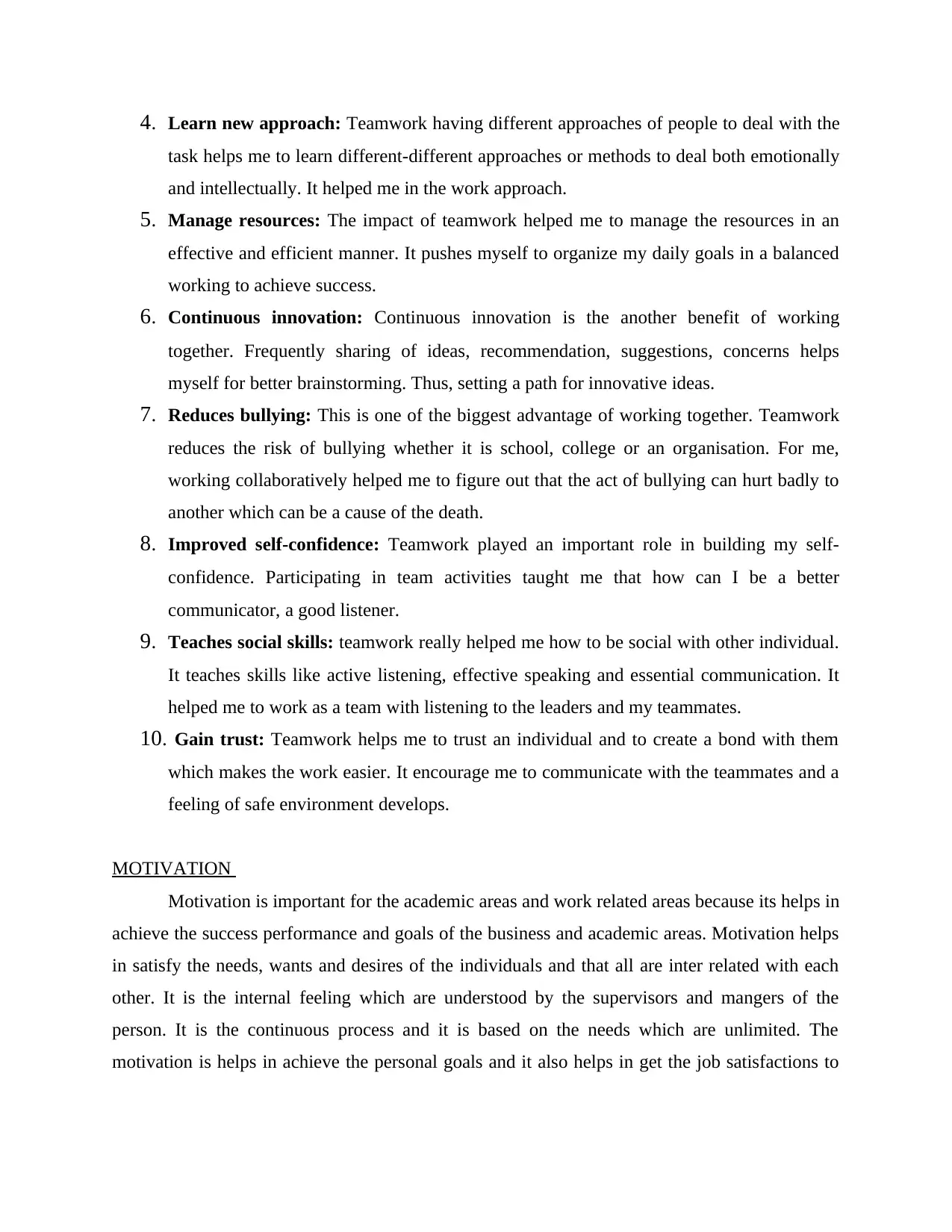
4. Learn new approach: Teamwork having different approaches of people to deal with the
task helps me to learn different-different approaches or methods to deal both emotionally
and intellectually. It helped me in the work approach.
5. Manage resources: The impact of teamwork helped me to manage the resources in an
effective and efficient manner. It pushes myself to organize my daily goals in a balanced
working to achieve success.
6. Continuous innovation: Continuous innovation is the another benefit of working
together. Frequently sharing of ideas, recommendation, suggestions, concerns helps
myself for better brainstorming. Thus, setting a path for innovative ideas.
7. Reduces bullying: This is one of the biggest advantage of working together. Teamwork
reduces the risk of bullying whether it is school, college or an organisation. For me,
working collaboratively helped me to figure out that the act of bullying can hurt badly to
another which can be a cause of the death.
8. Improved self-confidence: Teamwork played an important role in building my self-
confidence. Participating in team activities taught me that how can I be a better
communicator, a good listener.
9. Teaches social skills: teamwork really helped me how to be social with other individual.
It teaches skills like active listening, effective speaking and essential communication. It
helped me to work as a team with listening to the leaders and my teammates.
10. Gain trust: Teamwork helps me to trust an individual and to create a bond with them
which makes the work easier. It encourage me to communicate with the teammates and a
feeling of safe environment develops.
MOTIVATION
Motivation is important for the academic areas and work related areas because its helps in
achieve the success performance and goals of the business and academic areas. Motivation helps
in satisfy the needs, wants and desires of the individuals and that all are inter related with each
other. It is the internal feeling which are understood by the supervisors and mangers of the
person. It is the continuous process and it is based on the needs which are unlimited. The
motivation is helps in achieve the personal goals and it also helps in get the job satisfactions to
task helps me to learn different-different approaches or methods to deal both emotionally
and intellectually. It helped me in the work approach.
5. Manage resources: The impact of teamwork helped me to manage the resources in an
effective and efficient manner. It pushes myself to organize my daily goals in a balanced
working to achieve success.
6. Continuous innovation: Continuous innovation is the another benefit of working
together. Frequently sharing of ideas, recommendation, suggestions, concerns helps
myself for better brainstorming. Thus, setting a path for innovative ideas.
7. Reduces bullying: This is one of the biggest advantage of working together. Teamwork
reduces the risk of bullying whether it is school, college or an organisation. For me,
working collaboratively helped me to figure out that the act of bullying can hurt badly to
another which can be a cause of the death.
8. Improved self-confidence: Teamwork played an important role in building my self-
confidence. Participating in team activities taught me that how can I be a better
communicator, a good listener.
9. Teaches social skills: teamwork really helped me how to be social with other individual.
It teaches skills like active listening, effective speaking and essential communication. It
helped me to work as a team with listening to the leaders and my teammates.
10. Gain trust: Teamwork helps me to trust an individual and to create a bond with them
which makes the work easier. It encourage me to communicate with the teammates and a
feeling of safe environment develops.
MOTIVATION
Motivation is important for the academic areas and work related areas because its helps in
achieve the success performance and goals of the business and academic areas. Motivation helps
in satisfy the needs, wants and desires of the individuals and that all are inter related with each
other. It is the internal feeling which are understood by the supervisors and mangers of the
person. It is the continuous process and it is based on the needs which are unlimited. The
motivation is helps in achieve the personal goals and it also helps in get the job satisfactions to
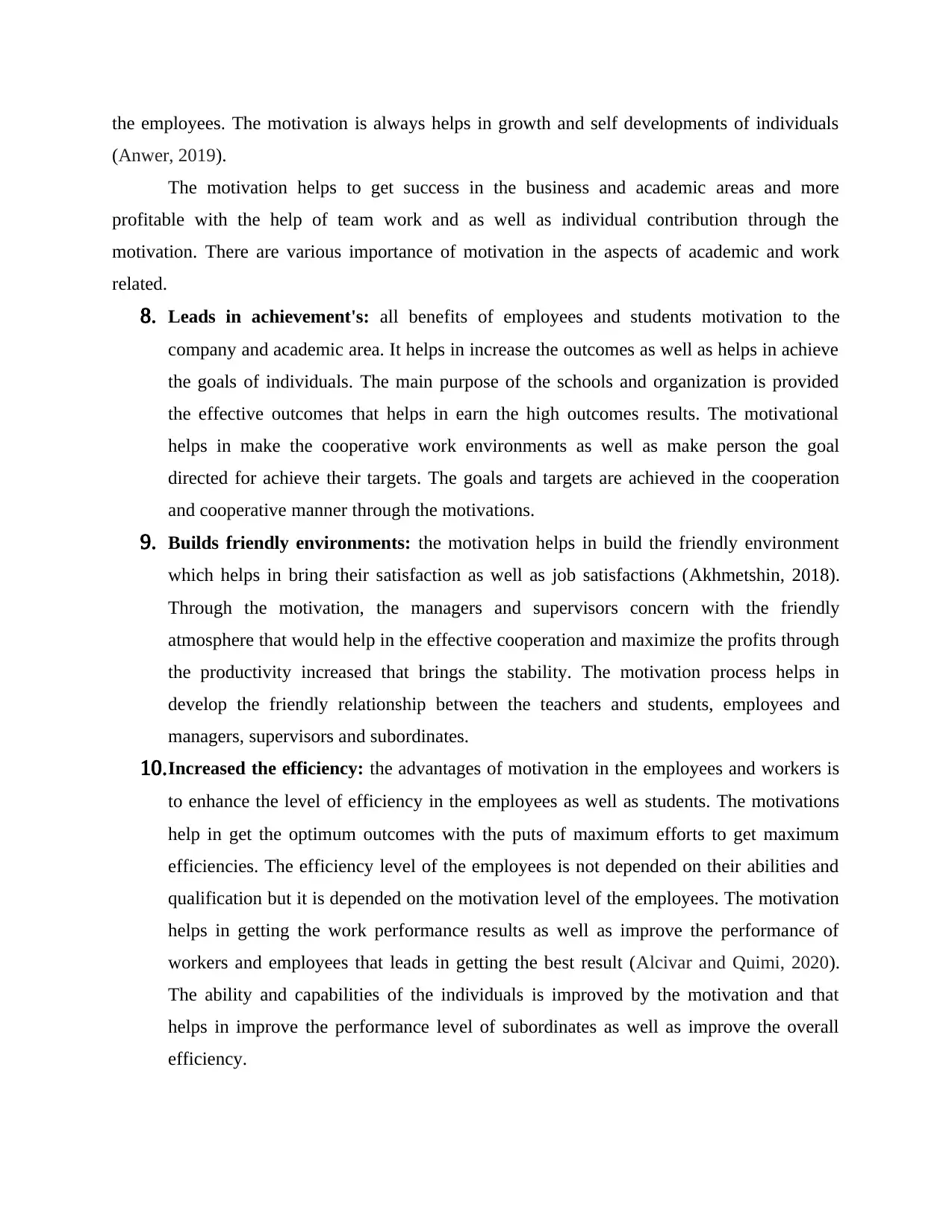
the employees. The motivation is always helps in growth and self developments of individuals
(Anwer, 2019).
The motivation helps to get success in the business and academic areas and more
profitable with the help of team work and as well as individual contribution through the
motivation. There are various importance of motivation in the aspects of academic and work
related.
8. Leads in achievement's: all benefits of employees and students motivation to the
company and academic area. It helps in increase the outcomes as well as helps in achieve
the goals of individuals. The main purpose of the schools and organization is provided
the effective outcomes that helps in earn the high outcomes results. The motivational
helps in make the cooperative work environments as well as make person the goal
directed for achieve their targets. The goals and targets are achieved in the cooperation
and cooperative manner through the motivations.
9. Builds friendly environments: the motivation helps in build the friendly environment
which helps in bring their satisfaction as well as job satisfactions (Akhmetshin, 2018).
Through the motivation, the managers and supervisors concern with the friendly
atmosphere that would help in the effective cooperation and maximize the profits through
the productivity increased that brings the stability. The motivation process helps in
develop the friendly relationship between the teachers and students, employees and
managers, supervisors and subordinates.
10.Increased the efficiency: the advantages of motivation in the employees and workers is
to enhance the level of efficiency in the employees as well as students. The motivations
help in get the optimum outcomes with the puts of maximum efforts to get maximum
efficiencies. The efficiency level of the employees is not depended on their abilities and
qualification but it is depended on the motivation level of the employees. The motivation
helps in getting the work performance results as well as improve the performance of
workers and employees that leads in getting the best result (Alcivar and Quimi, 2020).
The ability and capabilities of the individuals is improved by the motivation and that
helps in improve the performance level of subordinates as well as improve the overall
efficiency.
(Anwer, 2019).
The motivation helps to get success in the business and academic areas and more
profitable with the help of team work and as well as individual contribution through the
motivation. There are various importance of motivation in the aspects of academic and work
related.
8. Leads in achievement's: all benefits of employees and students motivation to the
company and academic area. It helps in increase the outcomes as well as helps in achieve
the goals of individuals. The main purpose of the schools and organization is provided
the effective outcomes that helps in earn the high outcomes results. The motivational
helps in make the cooperative work environments as well as make person the goal
directed for achieve their targets. The goals and targets are achieved in the cooperation
and cooperative manner through the motivations.
9. Builds friendly environments: the motivation helps in build the friendly environment
which helps in bring their satisfaction as well as job satisfactions (Akhmetshin, 2018).
Through the motivation, the managers and supervisors concern with the friendly
atmosphere that would help in the effective cooperation and maximize the profits through
the productivity increased that brings the stability. The motivation process helps in
develop the friendly relationship between the teachers and students, employees and
managers, supervisors and subordinates.
10.Increased the efficiency: the advantages of motivation in the employees and workers is
to enhance the level of efficiency in the employees as well as students. The motivations
help in get the optimum outcomes with the puts of maximum efforts to get maximum
efficiencies. The efficiency level of the employees is not depended on their abilities and
qualification but it is depended on the motivation level of the employees. The motivation
helps in getting the work performance results as well as improve the performance of
workers and employees that leads in getting the best result (Alcivar and Quimi, 2020).
The ability and capabilities of the individuals is improved by the motivation and that
helps in improve the performance level of subordinates as well as improve the overall
efficiency.
⊘ This is a preview!⊘
Do you want full access?
Subscribe today to unlock all pages.

Trusted by 1+ million students worldwide
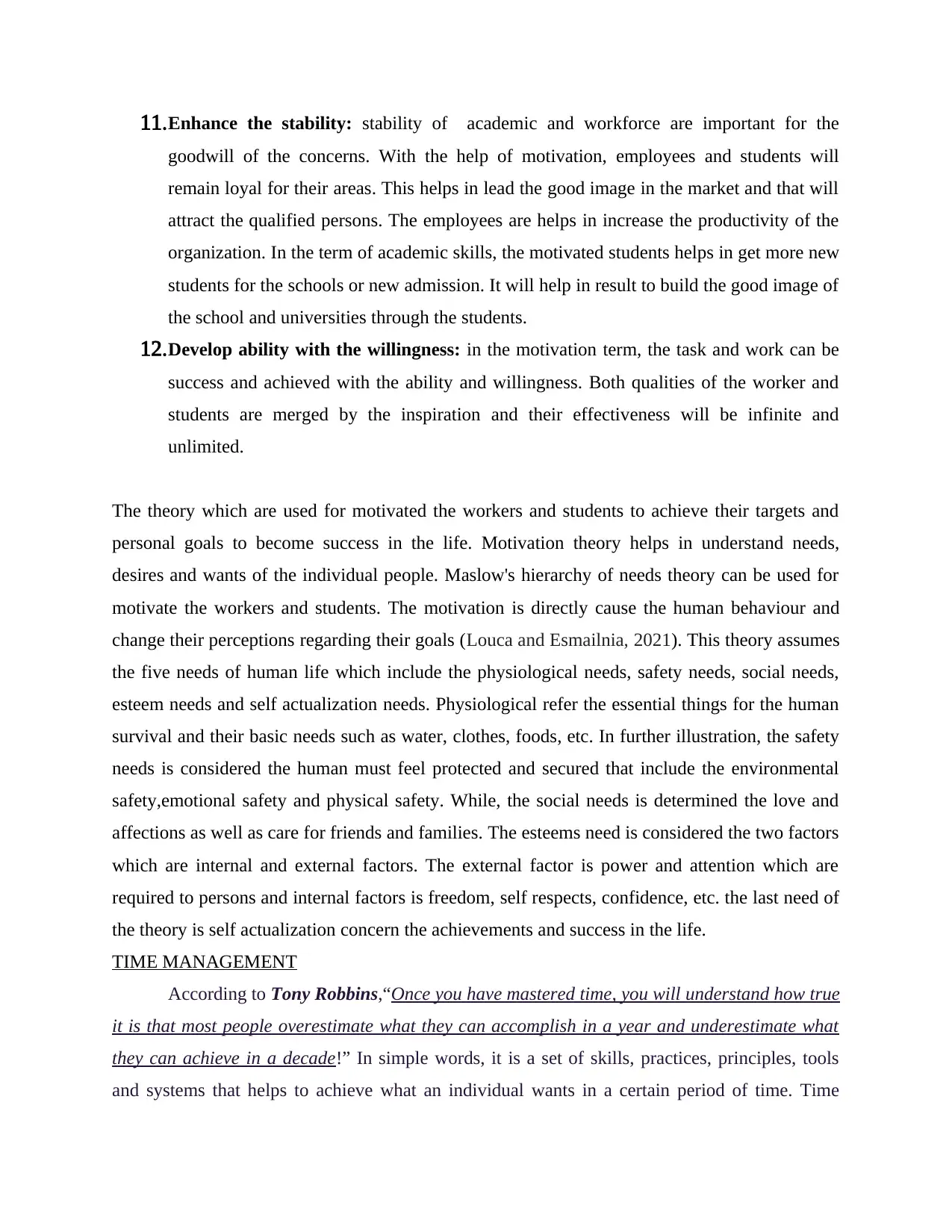
11.Enhance the stability: stability of academic and workforce are important for the
goodwill of the concerns. With the help of motivation, employees and students will
remain loyal for their areas. This helps in lead the good image in the market and that will
attract the qualified persons. The employees are helps in increase the productivity of the
organization. In the term of academic skills, the motivated students helps in get more new
students for the schools or new admission. It will help in result to build the good image of
the school and universities through the students.
12.Develop ability with the willingness: in the motivation term, the task and work can be
success and achieved with the ability and willingness. Both qualities of the worker and
students are merged by the inspiration and their effectiveness will be infinite and
unlimited.
The theory which are used for motivated the workers and students to achieve their targets and
personal goals to become success in the life. Motivation theory helps in understand needs,
desires and wants of the individual people. Maslow's hierarchy of needs theory can be used for
motivate the workers and students. The motivation is directly cause the human behaviour and
change their perceptions regarding their goals (Louca and Esmailnia, 2021). This theory assumes
the five needs of human life which include the physiological needs, safety needs, social needs,
esteem needs and self actualization needs. Physiological refer the essential things for the human
survival and their basic needs such as water, clothes, foods, etc. In further illustration, the safety
needs is considered the human must feel protected and secured that include the environmental
safety,emotional safety and physical safety. While, the social needs is determined the love and
affections as well as care for friends and families. The esteems need is considered the two factors
which are internal and external factors. The external factor is power and attention which are
required to persons and internal factors is freedom, self respects, confidence, etc. the last need of
the theory is self actualization concern the achievements and success in the life.
TIME MANAGEMENT
According to Tony Robbins,“Once you have mastered time, you will understand how true
it is that most people overestimate what they can accomplish in a year and underestimate what
they can achieve in a decade!” In simple words, it is a set of skills, practices, principles, tools
and systems that helps to achieve what an individual wants in a certain period of time. Time
goodwill of the concerns. With the help of motivation, employees and students will
remain loyal for their areas. This helps in lead the good image in the market and that will
attract the qualified persons. The employees are helps in increase the productivity of the
organization. In the term of academic skills, the motivated students helps in get more new
students for the schools or new admission. It will help in result to build the good image of
the school and universities through the students.
12.Develop ability with the willingness: in the motivation term, the task and work can be
success and achieved with the ability and willingness. Both qualities of the worker and
students are merged by the inspiration and their effectiveness will be infinite and
unlimited.
The theory which are used for motivated the workers and students to achieve their targets and
personal goals to become success in the life. Motivation theory helps in understand needs,
desires and wants of the individual people. Maslow's hierarchy of needs theory can be used for
motivate the workers and students. The motivation is directly cause the human behaviour and
change their perceptions regarding their goals (Louca and Esmailnia, 2021). This theory assumes
the five needs of human life which include the physiological needs, safety needs, social needs,
esteem needs and self actualization needs. Physiological refer the essential things for the human
survival and their basic needs such as water, clothes, foods, etc. In further illustration, the safety
needs is considered the human must feel protected and secured that include the environmental
safety,emotional safety and physical safety. While, the social needs is determined the love and
affections as well as care for friends and families. The esteems need is considered the two factors
which are internal and external factors. The external factor is power and attention which are
required to persons and internal factors is freedom, self respects, confidence, etc. the last need of
the theory is self actualization concern the achievements and success in the life.
TIME MANAGEMENT
According to Tony Robbins,“Once you have mastered time, you will understand how true
it is that most people overestimate what they can accomplish in a year and underestimate what
they can achieve in a decade!” In simple words, it is a set of skills, practices, principles, tools
and systems that helps to achieve what an individual wants in a certain period of time. Time
Paraphrase This Document
Need a fresh take? Get an instant paraphrase of this document with our AI Paraphraser
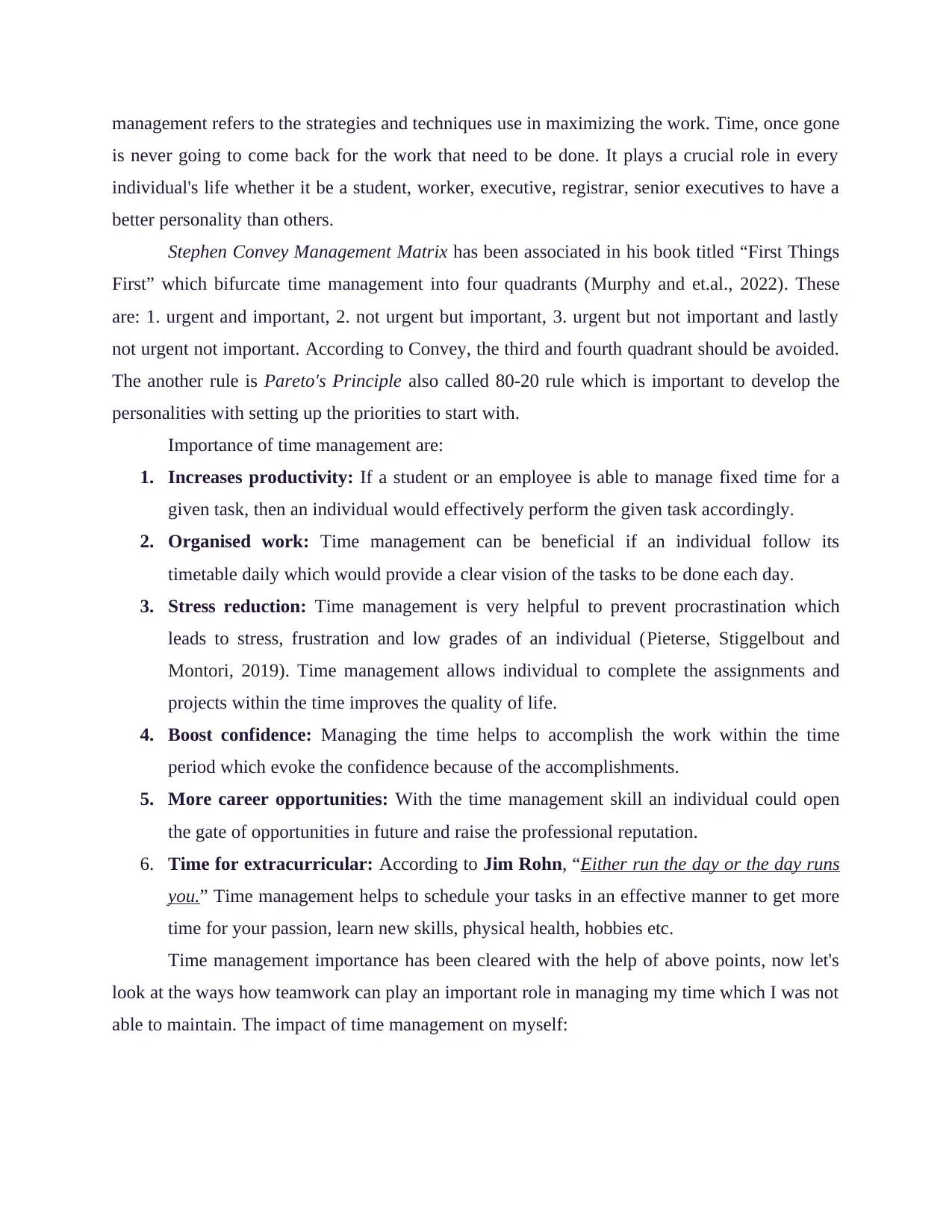
management refers to the strategies and techniques use in maximizing the work. Time, once gone
is never going to come back for the work that need to be done. It plays a crucial role in every
individual's life whether it be a student, worker, executive, registrar, senior executives to have a
better personality than others.
Stephen Convey Management Matrix has been associated in his book titled “First Things
First” which bifurcate time management into four quadrants (Murphy and et.al., 2022). These
are: 1. urgent and important, 2. not urgent but important, 3. urgent but not important and lastly
not urgent not important. According to Convey, the third and fourth quadrant should be avoided.
The another rule is Pareto's Principle also called 80-20 rule which is important to develop the
personalities with setting up the priorities to start with.
Importance of time management are:
1. Increases productivity: If a student or an employee is able to manage fixed time for a
given task, then an individual would effectively perform the given task accordingly.
2. Organised work: Time management can be beneficial if an individual follow its
timetable daily which would provide a clear vision of the tasks to be done each day.
3. Stress reduction: Time management is very helpful to prevent procrastination which
leads to stress, frustration and low grades of an individual (Pieterse, Stiggelbout and
Montori, 2019). Time management allows individual to complete the assignments and
projects within the time improves the quality of life.
4. Boost confidence: Managing the time helps to accomplish the work within the time
period which evoke the confidence because of the accomplishments.
5. More career opportunities: With the time management skill an individual could open
the gate of opportunities in future and raise the professional reputation.
6. Time for extracurricular: According to Jim Rohn, “Either run the day or the day runs
you.” Time management helps to schedule your tasks in an effective manner to get more
time for your passion, learn new skills, physical health, hobbies etc.
Time management importance has been cleared with the help of above points, now let's
look at the ways how teamwork can play an important role in managing my time which I was not
able to maintain. The impact of time management on myself:
is never going to come back for the work that need to be done. It plays a crucial role in every
individual's life whether it be a student, worker, executive, registrar, senior executives to have a
better personality than others.
Stephen Convey Management Matrix has been associated in his book titled “First Things
First” which bifurcate time management into four quadrants (Murphy and et.al., 2022). These
are: 1. urgent and important, 2. not urgent but important, 3. urgent but not important and lastly
not urgent not important. According to Convey, the third and fourth quadrant should be avoided.
The another rule is Pareto's Principle also called 80-20 rule which is important to develop the
personalities with setting up the priorities to start with.
Importance of time management are:
1. Increases productivity: If a student or an employee is able to manage fixed time for a
given task, then an individual would effectively perform the given task accordingly.
2. Organised work: Time management can be beneficial if an individual follow its
timetable daily which would provide a clear vision of the tasks to be done each day.
3. Stress reduction: Time management is very helpful to prevent procrastination which
leads to stress, frustration and low grades of an individual (Pieterse, Stiggelbout and
Montori, 2019). Time management allows individual to complete the assignments and
projects within the time improves the quality of life.
4. Boost confidence: Managing the time helps to accomplish the work within the time
period which evoke the confidence because of the accomplishments.
5. More career opportunities: With the time management skill an individual could open
the gate of opportunities in future and raise the professional reputation.
6. Time for extracurricular: According to Jim Rohn, “Either run the day or the day runs
you.” Time management helps to schedule your tasks in an effective manner to get more
time for your passion, learn new skills, physical health, hobbies etc.
Time management importance has been cleared with the help of above points, now let's
look at the ways how teamwork can play an important role in managing my time which I was not
able to maintain. The impact of time management on myself:
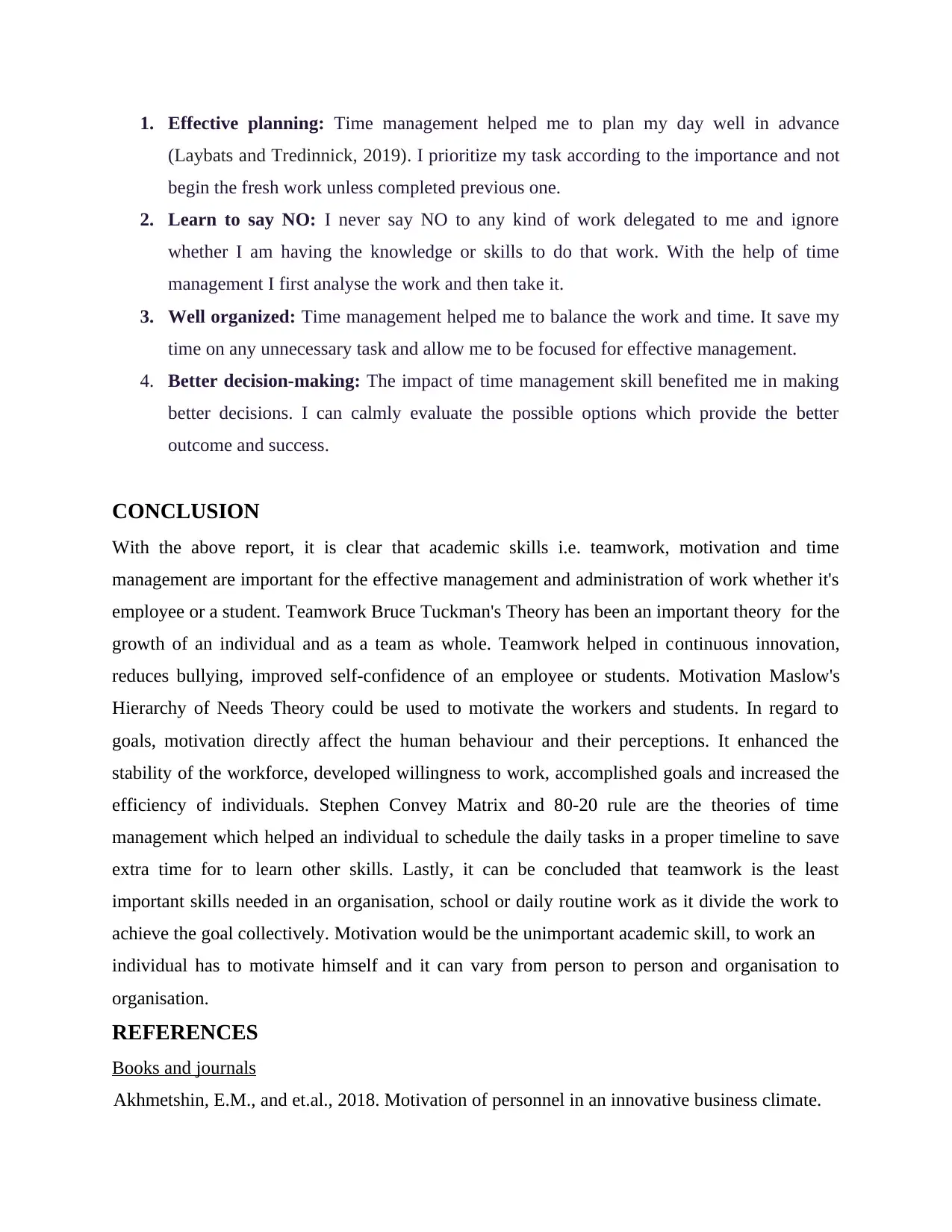
1. Effective planning: Time management helped me to plan my day well in advance
(Laybats and Tredinnick, 2019). I prioritize my task according to the importance and not
begin the fresh work unless completed previous one.
2. Learn to say NO: I never say NO to any kind of work delegated to me and ignore
whether I am having the knowledge or skills to do that work. With the help of time
management I first analyse the work and then take it.
3. Well organized: Time management helped me to balance the work and time. It save my
time on any unnecessary task and allow me to be focused for effective management.
4. Better decision-making: The impact of time management skill benefited me in making
better decisions. I can calmly evaluate the possible options which provide the better
outcome and success.
CONCLUSION
With the above report, it is clear that academic skills i.e. teamwork, motivation and time
management are important for the effective management and administration of work whether it's
employee or a student. Teamwork Bruce Tuckman's Theory has been an important theory for the
growth of an individual and as a team as whole. Teamwork helped in continuous innovation,
reduces bullying, improved self-confidence of an employee or students. Motivation Maslow's
Hierarchy of Needs Theory could be used to motivate the workers and students. In regard to
goals, motivation directly affect the human behaviour and their perceptions. It enhanced the
stability of the workforce, developed willingness to work, accomplished goals and increased the
efficiency of individuals. Stephen Convey Matrix and 80-20 rule are the theories of time
management which helped an individual to schedule the daily tasks in a proper timeline to save
extra time for to learn other skills. Lastly, it can be concluded that teamwork is the least
important skills needed in an organisation, school or daily routine work as it divide the work to
achieve the goal collectively. Motivation would be the unimportant academic skill, to work an
individual has to motivate himself and it can vary from person to person and organisation to
organisation.
REFERENCES
Books and journals
Akhmetshin, E.M., and et.al., 2018. Motivation of personnel in an innovative business climate.
(Laybats and Tredinnick, 2019). I prioritize my task according to the importance and not
begin the fresh work unless completed previous one.
2. Learn to say NO: I never say NO to any kind of work delegated to me and ignore
whether I am having the knowledge or skills to do that work. With the help of time
management I first analyse the work and then take it.
3. Well organized: Time management helped me to balance the work and time. It save my
time on any unnecessary task and allow me to be focused for effective management.
4. Better decision-making: The impact of time management skill benefited me in making
better decisions. I can calmly evaluate the possible options which provide the better
outcome and success.
CONCLUSION
With the above report, it is clear that academic skills i.e. teamwork, motivation and time
management are important for the effective management and administration of work whether it's
employee or a student. Teamwork Bruce Tuckman's Theory has been an important theory for the
growth of an individual and as a team as whole. Teamwork helped in continuous innovation,
reduces bullying, improved self-confidence of an employee or students. Motivation Maslow's
Hierarchy of Needs Theory could be used to motivate the workers and students. In regard to
goals, motivation directly affect the human behaviour and their perceptions. It enhanced the
stability of the workforce, developed willingness to work, accomplished goals and increased the
efficiency of individuals. Stephen Convey Matrix and 80-20 rule are the theories of time
management which helped an individual to schedule the daily tasks in a proper timeline to save
extra time for to learn other skills. Lastly, it can be concluded that teamwork is the least
important skills needed in an organisation, school or daily routine work as it divide the work to
achieve the goal collectively. Motivation would be the unimportant academic skill, to work an
individual has to motivate himself and it can vary from person to person and organisation to
organisation.
REFERENCES
Books and journals
Akhmetshin, E.M., and et.al., 2018. Motivation of personnel in an innovative business climate.
⊘ This is a preview!⊘
Do you want full access?
Subscribe today to unlock all pages.

Trusted by 1+ million students worldwide
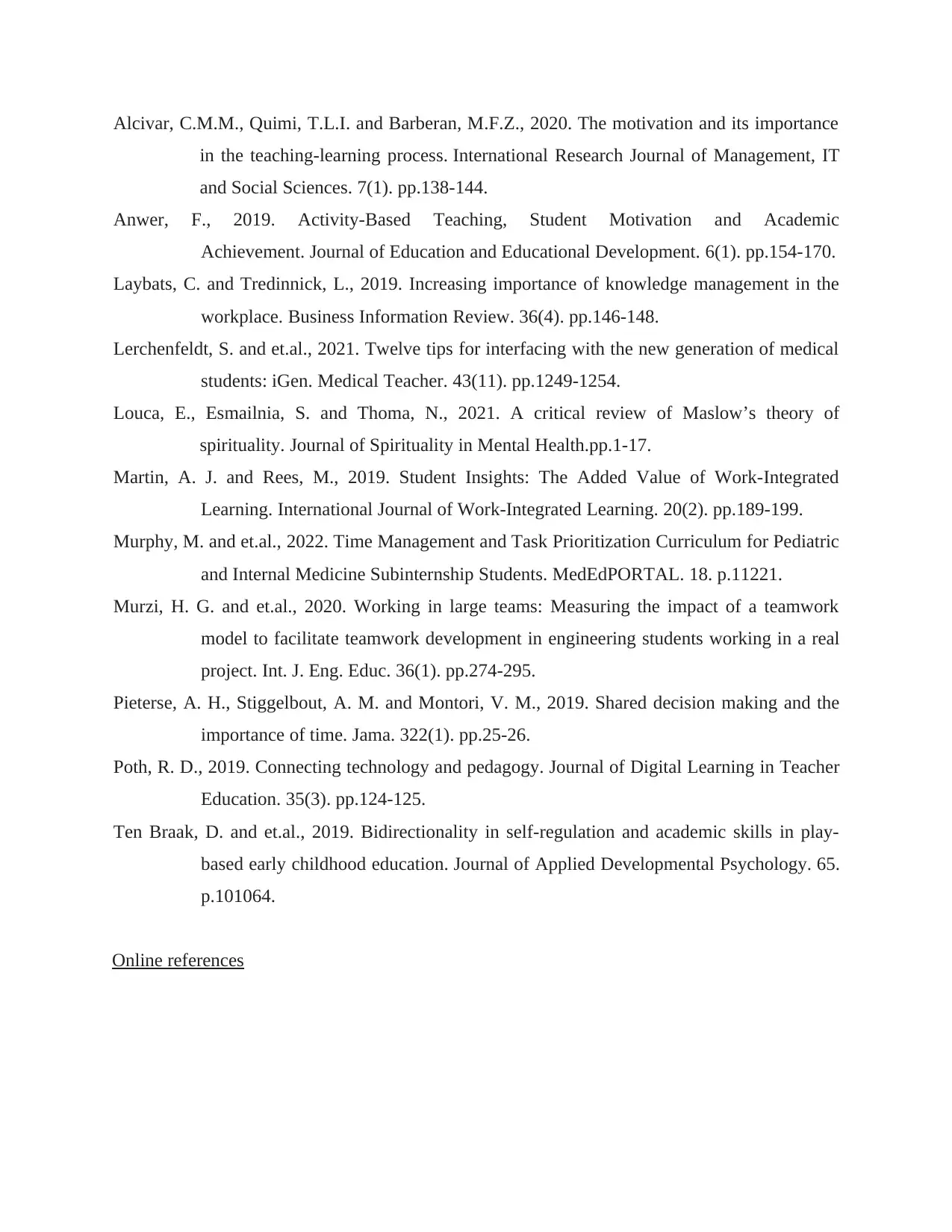
Alcivar, C.M.M., Quimi, T.L.I. and Barberan, M.F.Z., 2020. The motivation and its importance
in the teaching-learning process. International Research Journal of Management, IT
and Social Sciences. 7(1). pp.138-144.
Anwer, F., 2019. Activity-Based Teaching, Student Motivation and Academic
Achievement. Journal of Education and Educational Development. 6(1). pp.154-170.
Laybats, C. and Tredinnick, L., 2019. Increasing importance of knowledge management in the
workplace. Business Information Review. 36(4). pp.146-148.
Lerchenfeldt, S. and et.al., 2021. Twelve tips for interfacing with the new generation of medical
students: iGen. Medical Teacher. 43(11). pp.1249-1254.
Louca, E., Esmailnia, S. and Thoma, N., 2021. A critical review of Maslow’s theory of
spirituality. Journal of Spirituality in Mental Health.pp.1-17.
Martin, A. J. and Rees, M., 2019. Student Insights: The Added Value of Work-Integrated
Learning. International Journal of Work-Integrated Learning. 20(2). pp.189-199.
Murphy, M. and et.al., 2022. Time Management and Task Prioritization Curriculum for Pediatric
and Internal Medicine Subinternship Students. MedEdPORTAL. 18. p.11221.
Murzi, H. G. and et.al., 2020. Working in large teams: Measuring the impact of a teamwork
model to facilitate teamwork development in engineering students working in a real
project. Int. J. Eng. Educ. 36(1). pp.274-295.
Pieterse, A. H., Stiggelbout, A. M. and Montori, V. M., 2019. Shared decision making and the
importance of time. Jama. 322(1). pp.25-26.
Poth, R. D., 2019. Connecting technology and pedagogy. Journal of Digital Learning in Teacher
Education. 35(3). pp.124-125.
Ten Braak, D. and et.al., 2019. Bidirectionality in self-regulation and academic skills in play-
based early childhood education. Journal of Applied Developmental Psychology. 65.
p.101064.
Online references
in the teaching-learning process. International Research Journal of Management, IT
and Social Sciences. 7(1). pp.138-144.
Anwer, F., 2019. Activity-Based Teaching, Student Motivation and Academic
Achievement. Journal of Education and Educational Development. 6(1). pp.154-170.
Laybats, C. and Tredinnick, L., 2019. Increasing importance of knowledge management in the
workplace. Business Information Review. 36(4). pp.146-148.
Lerchenfeldt, S. and et.al., 2021. Twelve tips for interfacing with the new generation of medical
students: iGen. Medical Teacher. 43(11). pp.1249-1254.
Louca, E., Esmailnia, S. and Thoma, N., 2021. A critical review of Maslow’s theory of
spirituality. Journal of Spirituality in Mental Health.pp.1-17.
Martin, A. J. and Rees, M., 2019. Student Insights: The Added Value of Work-Integrated
Learning. International Journal of Work-Integrated Learning. 20(2). pp.189-199.
Murphy, M. and et.al., 2022. Time Management and Task Prioritization Curriculum for Pediatric
and Internal Medicine Subinternship Students. MedEdPORTAL. 18. p.11221.
Murzi, H. G. and et.al., 2020. Working in large teams: Measuring the impact of a teamwork
model to facilitate teamwork development in engineering students working in a real
project. Int. J. Eng. Educ. 36(1). pp.274-295.
Pieterse, A. H., Stiggelbout, A. M. and Montori, V. M., 2019. Shared decision making and the
importance of time. Jama. 322(1). pp.25-26.
Poth, R. D., 2019. Connecting technology and pedagogy. Journal of Digital Learning in Teacher
Education. 35(3). pp.124-125.
Ten Braak, D. and et.al., 2019. Bidirectionality in self-regulation and academic skills in play-
based early childhood education. Journal of Applied Developmental Psychology. 65.
p.101064.
Online references
1 out of 10
Related Documents
Your All-in-One AI-Powered Toolkit for Academic Success.
+13062052269
info@desklib.com
Available 24*7 on WhatsApp / Email
![[object Object]](/_next/static/media/star-bottom.7253800d.svg)
Unlock your academic potential
Copyright © 2020–2026 A2Z Services. All Rights Reserved. Developed and managed by ZUCOL.




